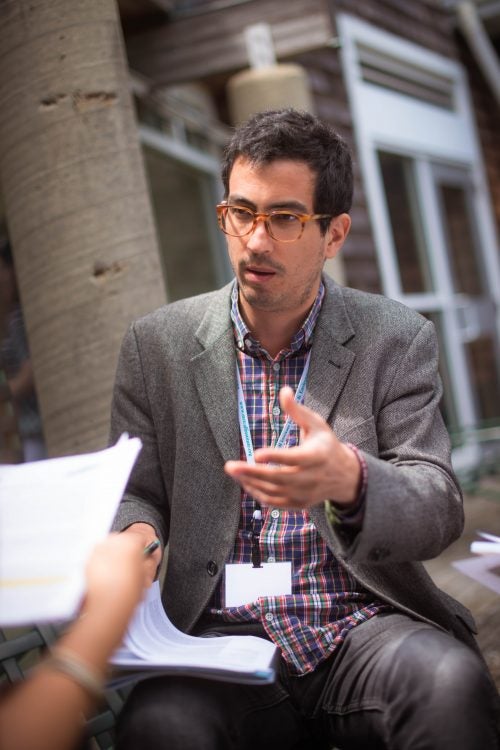 Sebastien Malo picked up a newspaper for the first time at the age of seven and was hooked.
Sebastien Malo picked up a newspaper for the first time at the age of seven and was hooked.
“I would sit at the dinner table in my dad’s chair and read the newspaper from cover to cover,” says Malo, an alumnus of Metcalf Institute’s 20th Annual Science Immersion Workshop for Journalists. “While most kids wanted to be truck drivers and firefighters, I wanted to be a journalist.”
Malo followed his dream but took a slightly unusual route. After earning a master’s degree in international affairs from the Graduate Institute of International Studies in Geneva, Switzerland, he joined the United Nations Political and Human Rights Division as part of Canada’s diplomatic corps. Malo was at the center of international politics where he actively participated in multilateral negotiations as a junior policy officer.
“I found my international affairs experience invaluable,” says Malo of his years spent in the diplomatic corps. “I think it really enriched my understanding of a lot of policy debates today.”
However, he never lost sight of the dream that took root at his family’s dinner table. “I wanted to start working in journalism,” he says. “I was at a crossroads.”
Two weeks later, Malo landed a job at The Daily Star, an English language newspaper in Beirut, Lebanon, where he covered a range of topics including Middle East politics and the Arab-Israeli conflict.
Malo went on to write for The New York World, an investigative news website, The Guardian, Time.com, The Atlantic, and La Presse, a newspaper based in Montreal, Canada.
He now writes stories for the Reuters newswire as a climate correspondent, a promotion he credits Metcalf’s Annual Workshop with helping him secure. In fact, his editor at Reuters strongly encouraged Malo to apply for the fellowship stating “this is the workshop to attend!”
“The fellowship reinforced in the eyes of my employer that I was really dedicated to climate change and to acquiring the necessary knowledge to properly cover the topic,” says Malo, whose stories reach an estimated 13 million readers a month. “It was among the best fellowships I’ve done.”
Malo particularly appreciated a workshop field trip to a salt marsh on the Rhode Island coast where the journalists saw the impacts of sea level rise and observed a coastal wetlands restoration project. “I was not super familiar with issues surrounding the importance of preserving marshlands,” says Malo. “Seeing it with my own eyes as opposed to reading about it in a report made it much more tangible and interesting to me,” he explains. Malo drew on lessons learned at Metcalf’s workshop for an article he wrote for Reuters about efforts to restore Louisiana’s eroding shoreline using recycled oyster shells to create manmade reefs. “The aim is to stop Louisiana’s shoreline crumbling away at the current rate of a football field every 100 minutes,” he wrote.
Malo has an opportunity to use the science knowledge he gained from Metcalf and his vast policy experience as he covers climate change on an international scale at the Conference of the Parties of the United Nations Framework Convention on Climate Change, or COP24, in Poland.
“Climate change is the ultimate political dilemma of our times because of the question of survival,” says Malo. “I find it extremely important to try to interest people in talking about climate change and to try to get them to reevaluate their daily lives and choices,” says Malo.
Read More Alumni Profiles